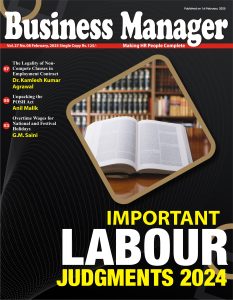The Karnataka High Court has dismissed an appeal challenging a Labour Court award, whereby an employee dismissed from service due to intermittent absence from work for attending to ailing relatives was ordered to be reinstated.
While dismissing the appeal, which was filed against the order of a Single Judge of the court that confirmed the award, the division bench of Chief Justice Prasanna B Varale and Justice Krishna S Dixit took into account the fact that the employee had put in 20 years of service before the disciplinary proceedings were initiated.
The Appellant/company had primarily argued that when intermittent unauthorized absence of a workman is involved, condoning lapse would breed indiscipline in the industrial sphere. Moreover, intermittent absence on account of health grounds of relatives, happening repeatedly, could not be shown leniency.
The Bench said, “The longevity of past service of the workman spurns the contention to the contrary, especially when the charge framed against him related to the period between July 2009 and April 2011, by which time he had already put in 20 years of long service. It hardly needs to be stated that a long service in any industrial establishment needs to be recognized as something advantageous to the workman, ordinarily.”
Also read: Unveiling the Menstrual Leave Taboo
Turning down the contention of the Appellant that medical certificates in respect of treatment of the workman’s family members (spouse and father) were produced for the first time before the Enquiry Officer, and not before the Management, the Bench said,
“It is not uncommon that at times the medical certificates are not submitted to the Management immediately and that they are produced before the Enquiry Officer. Ideally speaking, such a certificate should be produced to the Management which would consider the request of the workman for sanctioning leave, may be terms of extant Standing Orders. However, the breach of such a norm cannot be construed as going to the root of matter provided that a plausible explanation is offered for noncompliance of such a norm.”
It was added that the medical certificates relied upon by the workman had remained unconsidered. As such, the decision to falter with the punishment of dismissal was within the Labour Court’s discretionary power under Section 11A of the Industrial Disputes Act, 1947.
The Appellant’s contention that the award and the impugned order were liable to be voided as they may be quoted by unscrupulous workmen as precedents in justification of their unauthorized absence, at least in similar circumstances, did not weigh with the Bench. However, it clarified that the matter had been decided in the factual matrix of the case.
“Ordinarily, what punishment should be awarded in which circumstances, is employee – specific; in awarding punishment a host of factors enter the fray and that other employees cannot press into service as a precedent, what is done to their colleagues in the employment…It is said “Labour Law is not a slave of precedent…”.
Counsels for appellant: Senior Advocate S N Murthy for Advocate Somashekar
Counsel for respondent: Advocate B V Vishwanath
Citation No: 2023 LiveLaw (Kar) 494
Case Title: M/s SKF India Limited v. A V Nagabhushana
Case No: Writ Appeal No 997 of 2023
Stay connected with us on social media platform for instant update click here to join our LinkedIn, Twitter & Facebook



































